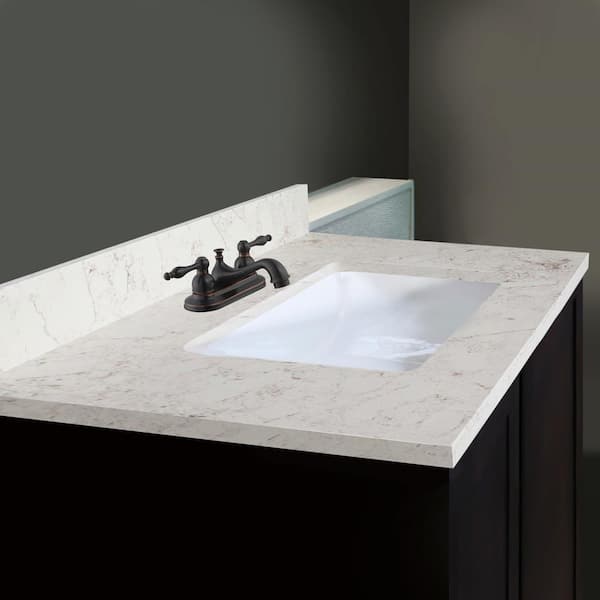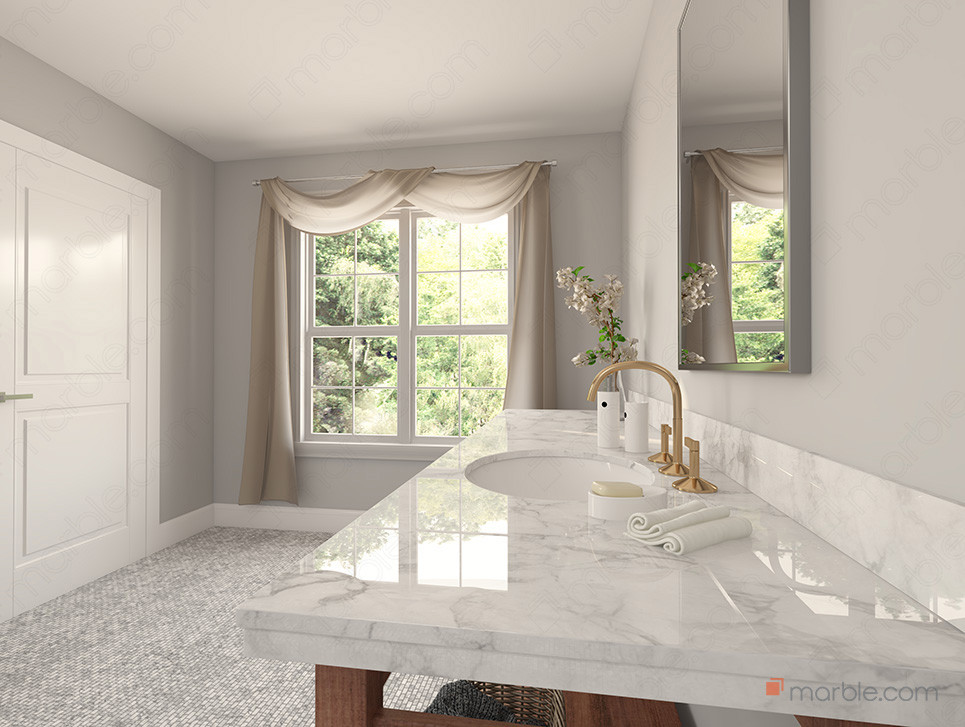Quartz bathroom vanity tops offer a blend of durability, beauty, and low maintenance that make them a popular choice for modern bathrooms. Composed of natural quartz crystals combined with resins and pigments, quartz countertops are engineered to be highly resistant to scratches, stains, and heat, making them ideal for high-traffic areas like bathrooms. One of the key advantages of quartz vanity tops is their non-porous surface, which prevents bacteria and mold growth and makes them easy to clean and maintain. Unlike natural stone countertops, quartz does not require sealing or special cleaning products, making it a hassle-free option for busy homeowners.
In terms of aesthetics, quartz bathroom vanity tops offer a wide range of colors, patterns, and finishes to suit any design preference or style. Whether you prefer a classic and timeless look with solid colors like white or gray, or a more bold and dramatic statement with veined or speckled patterns, there’s a quartz countertop option to fit your vision. Additionally, quartz countertops can be customized with edge profiles to further enhance the overall design aesthetic of your bathroom. From sleek and modern square edges to more decorative ogee or bullnose edges, the possibilities are virtually endless.
Another advantage of quartz bathroom vanity tops is their durability and longevity. Unlike natural stone countertops like marble or granite, quartz is less prone to chipping, cracking, or staining, making it a practical choice for bathrooms where moisture and humidity are common. Additionally, quartz countertops are UV resistant, meaning they won’t fade or discolor over time when exposed to sunlight, making them suitable for bathrooms with windows or skylights. With proper care and maintenance, quartz vanity tops can retain their beauty and functionality for many years to come, making them a worthwhile investment for any bathroom renovation project.
Installation of quartz bathroom vanity tops is relatively straightforward and can be completed by a professional countertop installer. The process typically involves measuring the dimensions of the vanity cabinet, cutting the quartz slab to size, and securing it in place with adhesive. Depending on the design and layout of your bathroom, the installer may also need to cut holes for the sink and faucet and polish the edges for a seamless finish. With the help of a skilled installer, you can achieve a flawless and custom look that enhances the overall design of your bathroom.
In terms of cost, quartz bathroom vanity tops are generally more affordable than natural stone options like marble or granite, making them a budget-friendly choice for homeowners. While the initial investment may be higher than laminate or solid surface countertops, the long-term durability and low maintenance requirements of quartz make it a cost-effective option in the long run. Additionally, many manufacturers offer warranties on their quartz countertops, providing added peace of mind and protection against defects or damage. Overall, quartz bathroom vanity tops offer a winning combination of durability, beauty, and value that make them an excellent choice for any bathroom renovation project.
Vazelli 43.5″ Single Bathroom Vanity Top in Polished with Sink
Quartz Bathroom Vanity Tops
allen + roth Calacatta quartz 37-in White Quartz Single Sink
Best Quartz Bathroom Countertops
allen + roth Calacatta quartz 61-in White Quartz Double Sink Bathroom Vanity Top
Wolf Quartz Bathroom Vanity Tops Wolf Home Products Quartz
Custom Bathroom Vanity Tops in Granite, Marble, Quartz u0026 Natural
allen + roth Calacatta quartz 31-in White Quartz Single Sink
White Quartz with The Sink Bathroom Vanity Top Bath Top – China
Related articles:
- Homemade Bathroom Vanity Ideas
- Bathroom Vanity Lighting Design Ideas
- Farmhouse Bathroom Vanity Lights
- Small Bathroom Vanity Ideas
- Bathroom Vanity Decorating Ideas
- Bathroom Vanity Decorating Ideas
- Bathroom Vanity Styles
- Bathroom Vanity Lighting Tips
- Custom Bathroom Vanity Cabinets
- Cottage Bathroom Vanity Ideas
Bathroom Vanity Tops Quartz: The Ultimate Guide
When it comes to bathroom design, the vanity top is often considered the centerpiece of the space. It’s not only a functional element but also an aesthetic one that can set the tone for the entire room. In recent years, quartz has become one of the most popular materials for bathroom vanity tops due to its durability, versatility, and aesthetic appeal. In this article, we’ll explore everything you need to know about bathroom vanity tops quartz.
What is Quartz?
Quartz is a natural mineral that’s abundant in the earth’s crust. It’s known for its hardness and durability, which makes it an ideal material for use in construction and home decor. However, raw quartz isn’t typically used as a building material. Instead, it’s mined and crushed into small pieces that are then combined with other materials to create quartz composite materials. These materials are used in a variety of applications, including countertops, flooring, and wall cladding.
Advantages of Bathroom Vanity Tops Quartz
There are many advantages to using quartz for your bathroom vanity top:
- Durability: Quartz is one of the hardest minerals on earth, making it extremely durable and resistant to scratches and chips.
- Stain Resistance: Because quartz is non-porous, it resists staining better than other natural stones like marble or granite.
- Easy Maintenance: Unlike natural stone surfaces that require regular sealing, quartz requires minimal maintenance.
- Consistency: Because quartz is manufactured using a controlled process, there are no variations in color or pattern between slabs.
- Versatility: Quartz can be manufactured in a wide range of colors and patterns to match any design style.
- Hygienic: Quartz is non-porous, which means it doesn’t harbor bacteria or germs as other materials can.
- Environmentally Friendly: Many manufacturers use recycled materials in their quartz composite products, making them a sustainable choice for your bathroom.
Can you cut directly on a quartz countertop?
While quartz is incredibly durable, it’s not recommended to cut directly on it. Using a cutting board will help prevent scratches and preserve the surface of your vanity top.
Can you put hot items on a quartz countertop?
Quartz is heat resistant, but it’s still recommended to use trivets or hot pads when placing hot items on the surface to prevent damage.
Does quartz require sealing?
No, unlike natural stones like granite and marble, quartz doesn’t require sealing.
Cost of Bathroom Vanity Tops Quartz
The cost of a quartz bathroom vanity top can vary depending on several factors, including the size of the space, the type of edging you choose, and the complexity of the design. On average, expect to pay between $50-$100 per square foot for materials and installation. While this may seem expensive compared to some other materials like laminate or tile, the durability and longevity of quartz make it a worthwhile investment for your home.
Is quartz more expensive than granite?
While prices can vary depending on location and other factors, in general, quartz tends to be slightly more expensive than granite.
How long does a quartz bathroom vanity top typically last?
With proper care and maintenance, a quartz vanity top can last for decades.
How to Clean and Maintain Bathroom Vanity Tops Quartz
One of the main advantages of using quartz for your bathroom vanity top is how easy it is to maintain. Here are some tips on how to keep your quartz looking its best:
Wipe up spills immediately: While quartz is stain-resistant, it’s still important to clean up spills right away before they have a chance to set in.
Use mild soap and water: For daily cleaning, simply use a soft cloth or sponge and mild soap and water to wipe down the surface.
Avoid harsh chemicals: Avoid using abrasive cleaners or harsh chemicals on your quartz vanity top as they can damage the surface.
Use a non-abrasive cleaner for tough stains: If you do encounter a tough stain, use a non-abrasive cleaner specifically designed for quartz surfaces.
Avoid using metal scouring pads: Metal scouring pads can scratch the surface of your quartz vanity top, so it’s best to avoid them altogether.
Is it safe to use vinegar on a quartz vanity top?
While vinegar is safe to use on many Surfaces, it’s not recommended for use on quartz as it can cause etching or damage to the surface.
Can you use bleach on a quartz vanity top?
While bleach can be effective for removing stains, it’s not recommended for use on quartz as it can discolor or damage the surface.
How often should you clean your quartz vanity top?
It’s recommended to clean your quartz vanity top daily or as needed to prevent the buildup of dirt and grime.










